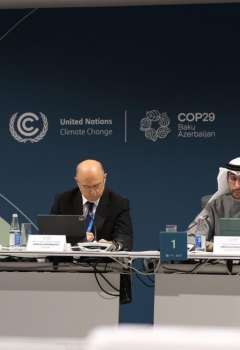Urgent
Emirates, flydubai serve 19 million passengers over 7 years
 UAE marks Diwali with grand celebration in Dubai
UAE marks Diwali with grand celebration in Dubai
 UAE hails COP29 progress on Loss and Damage Fund
UAE hails COP29 progress on Loss and Damage Fund
 Sharjah Ruler appoints members to key judicial responsibilities
Sharjah Ruler appoints members to key judicial responsibilities
 Lulu Retail starts trading on ADX
Lulu Retail starts trading on ADX
 Masdar to develop 1 GW windfarm in Kazakhstan
Masdar to develop 1 GW windfarm in Kazakhstan
 ne’ma collaborates with Taste of Abu Dhabi as official food waste reduction partner
ne’ma collaborates with Taste of Abu Dhabi as official food waste reduction partner
 EGA extends CelestiAL-R supply agreement with BMW Group
EGA extends CelestiAL-R supply agreement with BMW Group

 UAE marks Diwali with grand celebration in Dubai
UAE marks Diwali with grand celebration in Dubai
 UAE hails COP29 progress on Loss and Damage Fund
UAE hails COP29 progress on Loss and Damage Fund
 Sharjah Ruler appoints members to key judicial responsibilities
Sharjah Ruler appoints members to key judicial responsibilities
 Lulu Retail starts trading on ADX
Lulu Retail starts trading on ADX
 Masdar to develop 1 GW windfarm in Kazakhstan
Masdar to develop 1 GW windfarm in Kazakhstan
 ne’ma collaborates with Taste of Abu Dhabi as official food waste reduction partner
ne’ma collaborates with Taste of Abu Dhabi as official food waste reduction partner
 EGA extends CelestiAL-R supply agreement with BMW Group
EGA extends CelestiAL-R supply agreement with BMW Group











Comments